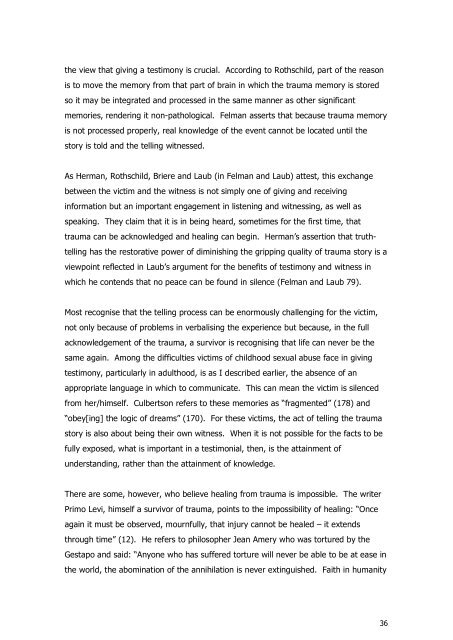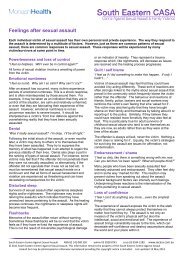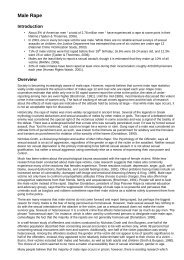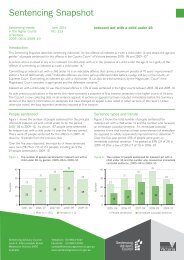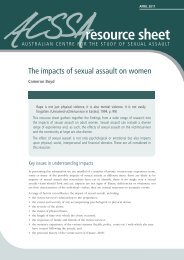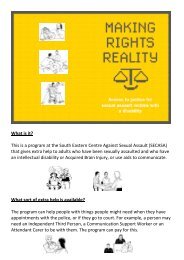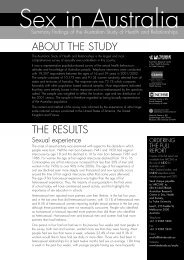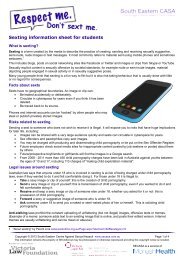- Page 1 and 2: THE CREATIVE SPACE Art and wellbein
- Page 3 and 4: ABSTRACT This thesis explores the r
- Page 5 and 6: Impervious spaces .................
- Page 7 and 8: Simone White, Fur, Anne S, Glynis E
- Page 9 and 10: that future generations would be si
- Page 11 and 12: enormous amounts of time pursuing o
- Page 13 and 14: the humanities, and undoubtedly one
- Page 15 and 16: actualisation, referring to the hum
- Page 17 and 18: 3 LITERATURE REVIEW This literature
- Page 19 and 20: concept of wellbeing recognises tha
- Page 21 and 22: Arts in Health practice: how do art
- Page 23 and 24: terrorism and natural disaster (in
- Page 25 and 26: momentous experiences. Those who ar
- Page 27 and 28: Above are some of the common respon
- Page 29 and 30: of childhood sexual assault (CSA) a
- Page 31 and 32: around are being formed and when th
- Page 33 and 34: The “sense” or “felt” memor
- Page 35: Auschwitz. The historians, aware th
- Page 39 and 40: expression relate to the victims. B
- Page 41 and 42: Mourning is a dreaded task for surv
- Page 43 and 44: Gillies and Robert A Neimeyer ident
- Page 45 and 46: choosing to belong to a family one
- Page 47 and 48: possibilities revealed? (507). When
- Page 49 and 50: soldiers. The emotional burden of t
- Page 51 and 52: Materials and their transformation
- Page 53 and 54: find a contemplative space in which
- Page 55 and 56: the familiar and courting the unkno
- Page 57 and 58: addition, how might words be used t
- Page 59 and 60: incomplete catalogue of sexual abus
- Page 61 and 62: All groups reached capacity and som
- Page 63 and 64: counsellors’ presence within the
- Page 65 and 66: In addition to these questions, I a
- Page 67 and 68: theories that ground how counsellor
- Page 69 and 70: Studio practice An investigation in
- Page 71 and 72: Many of the works are small, someti
- Page 73 and 74: 5 ART IN THE SHADOW OF TRAUMA So th
- Page 75 and 76: ascribed to the various human excha
- Page 77 and 78: gave them freedom to experiment. Mo
- Page 79 and 80: desires were irrelevant to their ar
- Page 81 and 82: A significant shift in individual w
- Page 83 and 84: Nonetheless, dark shadows occasiona
- Page 85 and 86: than that!” “Fine”!! I starte
- Page 87 and 88:
In the first section below, I discu
- Page 89 and 90:
With hundreds of drawings spread ar
- Page 91 and 92:
I have always taken a back seat, I
- Page 93 and 94:
Schmidt offers insights into this b
- Page 95 and 96:
Garner proposes we each need to fin
- Page 97 and 98:
For some of these women, functionin
- Page 99 and 100:
a creative collaboration with me an
- Page 101 and 102:
“always being compromised”. Whi
- Page 103 and 104:
Water I did the fire one, and it to
- Page 105 and 106:
The women’s evolution, from the e
- Page 107 and 108:
pair of participants make a large p
- Page 109 and 110:
Notwithstanding their doubts, the p
- Page 111 and 112:
In its ordinariness, it was also pr
- Page 113 and 114:
desire to hold and nurture a develo
- Page 115 and 116:
flash, like a no-brainer!” She sa
- Page 117 and 118:
Barb had not seen me make art and t
- Page 119 and 120:
suggests that art-making is not sim
- Page 121 and 122:
“voiceless” as a result. This i
- Page 123 and 124:
The pain of the actual trauma was,
- Page 125 and 126:
So, it was doing something, but I d
- Page 127 and 128:
I am becoming one fine damn woman!
- Page 129 and 130:
artist, but I love art”. Yet she
- Page 131 and 132:
It doesn’t make a statement any m
- Page 133 and 134:
her children with her conflicted in
- Page 135 and 136:
In undertaking the project with ser
- Page 137 and 138:
It is hard to underestimate the sig
- Page 139 and 140:
This chapter maps the landscape in
- Page 141 and 142:
impediments to social connectedness
- Page 143 and 144:
visualise a different and better fu
- Page 145 and 146:
Figure 1 Paver Figure 2 Mirror Figu
- Page 147 and 148:
Figure 6 Fire Figure 7 Water iii
- Page 149 and 150:
Figure 10 Paver Figure 11 Birds v
- Page 151 and 152:
Figure 14 Mini Me Figure 15 Nude vi
- Page 153 and 154:
6 ART IN THE SHADOW OF TRAUMA, LOSS
- Page 155 and 156:
Sexual abuse, the inspiration behin
- Page 157 and 158:
corrode the plate, he created a lan
- Page 159 and 160:
discusses how the distorting and th
- Page 161 and 162:
The oversized and triumphant, and o
- Page 163 and 164:
when the experience is so alien and
- Page 165 and 166:
As land available to the village is
- Page 167 and 168:
Forbidden Memory (Figures 11 and 12
- Page 169 and 170:
embedded in Doilies, are an express
- Page 171 and 172:
This question challenged my creativ
- Page 173 and 174:
and emptied of life. The angelic wh
- Page 175 and 176:
completely flow away, change colour
- Page 177 and 178:
Accommodation Art-making keeps the
- Page 179 and 180:
engagement that comes with an immer
- Page 181 and 182:
public discussion about sexual abus
- Page 183 and 184:
Figure 3 Uncomforted and Comfortles
- Page 185 and 186:
Figure 7 These Ancient Sorrows (sel
- Page 187 and 188:
Figure 17 Forbidden Memory (selecti
- Page 189 and 190:
Figure 15 Seeping into the Groundwa
- Page 191 and 192:
Figures 17 and 18 Ghosts of a Lost
- Page 193 and 194:
Figure 21 selection of small river
- Page 195 and 196:
7 ART IN THE SHADOW OF LOSS AND GRI
- Page 197 and 198:
that they were able to temper their
- Page 199 and 200:
Kollwitz, for example, is important
- Page 201 and 202:
childhood and the feelings experien
- Page 203 and 204:
The creation of personal, meaningfu
- Page 205 and 206:
transformation and objectification
- Page 207 and 208:
the desire to use the clay, and “
- Page 209 and 210:
Gesture and Body For figurative scu
- Page 211 and 212:
Taboos were largely conquered soon
- Page 213 and 214:
them, she is just apart from them.
- Page 215 and 216:
odds with this intention. What did
- Page 217 and 218:
participants told of relationships
- Page 219 and 220:
the fear of participants’ anger b
- Page 221 and 222:
gruesome, like it was “made by a
- Page 223 and 224:
the whole look of it, instead of be
- Page 225 and 226:
emphasised the point I raised in Ch
- Page 227 and 228:
The second heart is sculptural, mad
- Page 229 and 230:
Linda’s Boat (Figure 12) is an ex
- Page 231 and 232:
Some participants intentionally mad
- Page 233 and 234:
oom, it collapsed when I moved it t
- Page 235 and 236:
lead a harmonious life. All but one
- Page 237 and 238:
commonly avoided, painful and slow,
- Page 239 and 240:
I find it intriguing that the plast
- Page 241 and 242:
to approach her artwork and herself
- Page 243 and 244:
comfort; others flop in pain and in
- Page 245 and 246:
public through small and large exhi
- Page 247 and 248:
where art comes from; being able to
- Page 249 and 250:
Figure 3 Pain Figure 4 CASA Dolls i
- Page 251 and 252:
Figure 7 No! Figure 8 Man with Nail
- Page 253 and 254:
Figure 11 Heart II Figure 12 Boat F
- Page 255 and 256:
Figure 16 Family Figure 17 Lovers v
- Page 257 and 258:
8 IN DAPPLED SHADOWS I began this t
- Page 259 and 260:
of what is revealed in this thesis
- Page 261 and 262:
ushfires and to other communities b
- Page 263 and 264:
and artists contribute to wellbeing
- Page 265 and 266:
acknowledging and living. I referre
- Page 267 and 268:
The artist’s practice In his stud
- Page 269 and 270:
conducive for learning, transformat
- Page 271 and 272:
the other women. Most were embolden
- Page 273 and 274:
each happens is unique and signific
- Page 275 and 276:
emotions poured from them, women so
- Page 277 and 278:
I said earlier that those who go th
- Page 279 and 280:
An important finding of the thesis
- Page 281 and 282:
esearch subject added another unexp
- Page 283 and 284:
Yes, because as I said, I have been
- Page 285 and 286:
obbed of sunshine and light, they c
- Page 287 and 288:
Figure 3 Grieving Parents, Kathe Ko
- Page 289 and 290:
Belau, Linda. "Trauma and the Mater
- Page 291 and 292:
Cubilie, Anne. Women Witnessing Ter
- Page 293 and 294:
---. "The Prevention of Childhood S
- Page 295 and 296:
Hanh, Thich Nhat. The Heart of the
- Page 297 and 298:
Kelly, Anita. The Psychology of Sec
- Page 299 and 300:
Martin, Jay. "Against Consolation.
- Page 301 and 302:
Rando, Therese A. Treatment of Comp
- Page 303 and 304:
Spurling, Florence, and Enda McDona
- Page 305 and 306:
Winnicott, DW. The Child, the Famil
- Page 307 and 308:
Letter of invitation to participate
- Page 309 and 310:
Information given to participants (
- Page 311 and 312:
For the period of the art sessions,
- Page 313 and 314:
Recording consent (Printed on VU Le
- Page 315 and 316:
Entry and exit interview questions


